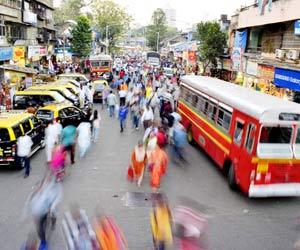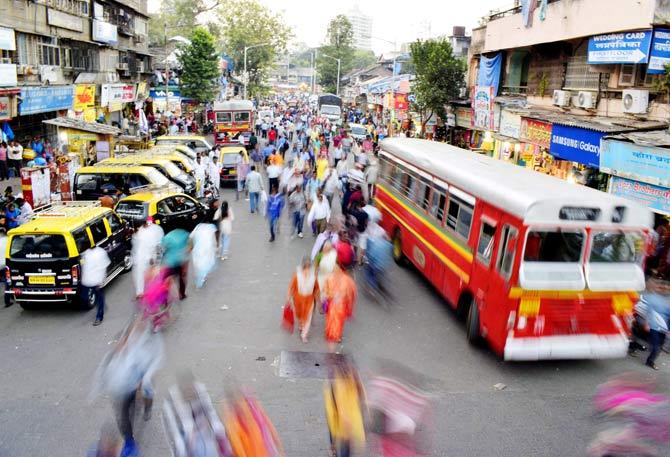Millions of Indian women, especially those in our city, are dropping out of their workplaces. No one cares enough to find out why

How do women work in Bombay? It's a question that human resources professionals ought to ask themselves more often, but probably don't, because thinking about employee welfare isn't really encouraged in corporate India. It's also why I have, in all my years as a media professional, yet to meet an HR representative who displayed any signs of empathy towards the conditions in which so many women work in our city.
ADVERTISEMENT

We simply fail to consider how dehumanising our public transport is, how demeaning it is for women and children who don't even have access to decent toilets. File pic
A friend tells me about the 11-hour shifts she is forced to work, five days a week, for a start-up that routinely publishes articles on its blog about how brilliant its office décor is. She tells me about the complete lack of sensitivity towards female employees, who have no choice but to figure out how to get to and from the office long after their legal eight hours are over. The office is located in a swanky mall so far from railway stations that employees have no choice but to rely on radio cabs - with no reimbursements from the company, obviously - to get home, often after 11 pm. She tells me about rude cab drivers, drunk drivers, drivers who routinely cancel trips illegally because the app companies don't care about customer service, and even a driver who once asked one of her colleagues to get out in the middle of the Eastern Freeway at midnight, because he didn't want to travel to her particular locality.
If this is how women in our city function when they earn enough pay for a cab, how about the millions forced to rely on public transport to get home? Try getting into a local at Churchgate after 5 pm for an insight into the inhuman conditions in which so many of them travel, to far-flung suburbs hours away from their offices, where they must then get into dismal kitchens and prepare dinners for their families. Consider why so many women use their commutes not to relax, because that is impossible, but to complete chores like the cleaning and dicing of vegetables, after having put in a full day's work at their workplaces.
I spoke to a few other women about this, to try and figure out if any of them like working in Bombay. A number of them said they liked their jobs, but couldn't see themselves working there for a prolonged period of time simply because it exhausted them. Those who had the luxury of owning vehicles spoke of hours stuck in traffic, unreasonable deadlines imposed by bosses (always men, naturally) who simply didn't consider their physical well-being, or deploy common sense when asking them to work long hours while they were menstruating, and the unspoken shadow of sexual harassment that, unsurprisingly, looms larger than any of us care to think.
Some of these conversations brought to my mind a personal experience from a little over two years ago, when I worked at a start-up managed entirely by men, and specifically complained to the female head of human resources about rampant sexism in the workplace. The representative heard me out, told me my accusations were serious, and promised to do something about them. She did nothing.
Senior management executives of that particular company continued to evaluate female colleagues in board rooms, one of them insisted on his subordinates only hiring pretty women, while a couple of the others spent hours discussing the personal lives of some of the women reporting to them. I quit, while the people at that company continue to be gainfully employed there.
Human resource professionals need to empathise more, not because women can understand the needs of women better, but because we all need to recognise that working in our city is a nightmare for millions. We simply fail to consider how dehumanising our public transport is, how demeaning it is for women and children who don't even have access to decent toilets, and how none of this is ever taken into consideration by companies who turn a blind eye to how their female employees get to work and back.
Sadly, I don't expect this to change either. India's financial capital ignores everything from crumbling infrastructure to blatant corruption, potholes to ruthless hospitals. We don't even care enough to vote qualified people to power, and watch television while elected officials sell parts of our city to the highest bidders. Why would we start caring about women? It's why no one raises en eyebrow at reports of millions dropping out of the workplace. Why wouldn't they?
When he isn't ranting about all things Mumbai, Lindsay Pereira can be almost sweet. He tweets @lindsaypereira. Send your feedback to [email protected]
Download the new mid-day Android and iOS apps to get updates on all the latest and trending stories on the go
 Subscribe today by clicking the link and stay updated with the latest news!" Click here!
Subscribe today by clicking the link and stay updated with the latest news!" Click here!






